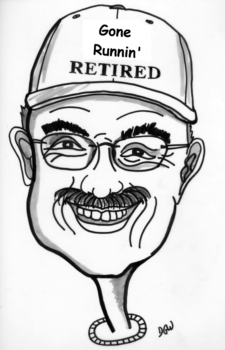The 108th Tour de France wrapped this past Sunday. The NBC Sports Channel has carried each race stage in its entirety for the past many years.
After my morning runs, I’ll usually watch an hour while stretching. Since I’ve recorded the race on my Tivo, I will skip through the commercials and the nonaction parts of each stage.
The forming breakaway, intermediate sprints, hill climbs, and the finish are gripping, as are the crashes. The latter has the same appeal as NASCAR.
Usually, the first week of the tour has flat stages, and with the packed peloton, many crashes. The first two were in the first stage.
A spectator caused the first one by hanging a sign over the road. This crash broke come bones, broke some bikes, and eliminated a few riders. The assailant surrendered to authorities, who will not be pressing criminal charges. The was close to $500,000 in damaged bikes and bodies. I hope they have good insurance to cover the civil misconduct.
A sudden bend in a narrowing roadway caused the second crash. Better organizational planning and conditions review could have prevented this crash.
Overall there were 184 starters and 141 finishers. Of the 43 abandonments, none were COVID-related, and I don’t remember any reports of positive COVID tests amongst the athletes, coaches, or support staff. Some of the abandonments were athletes leaving early for the Olympics. Most were crash or time limit related.
Sometimes in every professional cyclist’s career, they will crash, and they will break a bone. Crashes leave physical scrapes as the spandex will shred, leaving exposed skin sliding down the asphalt at 35 miles per hour. I’m not sure how a cyclist gets back on their bike and rides at those speeds again.
Professional bike stage races impose time limits on the finishers. The time limits are a percentage of the first finisher’s time.
Organizers will increase the ratio, depending on the difficulty of the stage. The Tour drops a rider not finishing in the time limit.
Time limits are imposed so a rider can not rest on one day to excel on the next stage or recover from the previous ride. So, unlike our small road races, i.e., Devil’s Den 10 mile, the Tour may shut down the roads through a town for 15 minutes for the entire field to pass.
For the third consecutive Tour, a 22-year-old rider has won the General Classification, better known as Yellow Jersey. This honor is awarded for the lowest total time to complete the 21 stages.
In bicycle racing tradition, riders younger than 26 years old are not supposed to win the overall title. They are supposed to be too inexperienced and lack stamina. Teams would bring in young riders to support their elder teammates by breaking wind, setting the pace, and retrieving bottles.
Because of this tradition, the Tours created a Young Riders Classification and awarded White Jersey to the rider younger than 26 years old with the lowest time. Perhaps, it’s time to change White Jersey to be either the first rider 26 or over when the Yellow Jersey winner is under 26 years old.
Tadej Pogacar (ta-day po-got-cha) from Solvenia has won the Yellow and White Jersey’s the past two years. In addition, he won the Polka Dot Jersey for the King of the Mountain (KOM).
I know watching cycling races maybe like watching paint dry. Perhaps, the KOM criteria need to be changed to reduce the impact of high mountain finishes. Pogacar only scored points on 6 of the 58 climbs with enough points to win on three mountain top race finishes.
The NBC Sports Channel is the rebrand of the Discovery Channel, which is the rebrand of OLN. I remember watching the Tour since 2001. NBC is disbanding their NBC Sports Channel. I wonder, who will be broadcasting the Tour in 2022?
The broadcast production has five on-air expert announcers: Adam Blythe, Bob Roll, Phil Liggett, Chris Horner, and Christian Vande Velde. All are past professional cyclists, and the latter was part of the US Postal team and was penalized for doping.
They are a good team of analysts and make the 5-hour stages interesting to watch. They have a friendly stage prediction competition. They cycle through who has the first pick each day. So, based on a stages configuration, who luckily picks first has an advantage. Maybe for the first ten stages, they could retain the current rotation and then do their picks with the lowest score going first sequence in the final ten stages. It would be interesting.
The Vuelta will be on later this summer and then the World Champs. I hope they find a broadcast network for 2022. I need something to keep me stretching in July.
